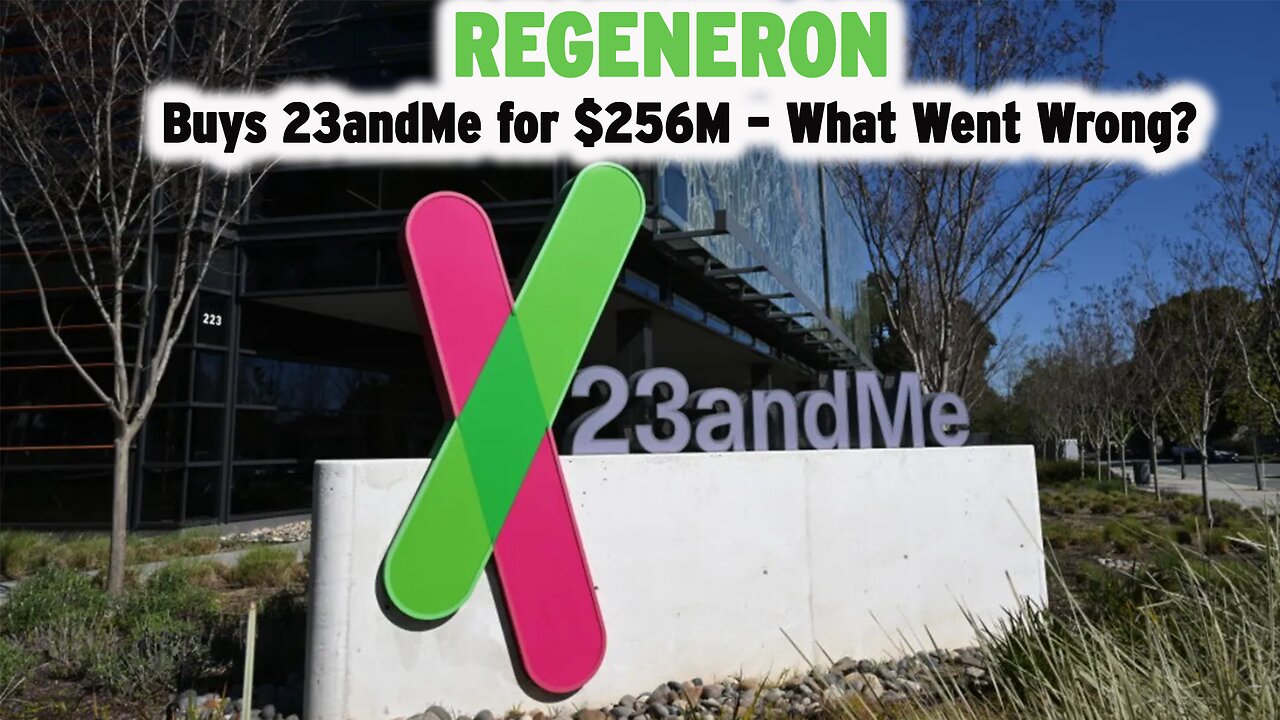Premium Only Content

The Rise and Fall of 23andMe: Bought by Regeneron for $256 Million | NEWSDRIFT
Discover the shocking story behind the rise and fall of **23andMe**, once a \$6 billion genetic testing giant, now sold to **Regeneron Pharmaceuticals** for just **\$256 million**. In this video, we break down how 23andMe revolutionized the DNA testing industry, what led to its downfall—including a massive **data breach affecting 6.9 million users**, financial losses, and leadership changes—and why **Regeneron** stepped in to acquire it during bankruptcy.
Learn how this deal could reshape the future of **personal genomics**, **data privacy**, and **biotech innovation**. Whether you're interested in health tech, business news, or genetics, this video gives you all the essential insights.
🔍 Topics Covered:
* 23andMe bankruptcy explained
* Regeneron’s \$256M acquisition
* DNA data privacy concerns
* Impact on the genetic testing industry
* Future of personalized medicine
📌 Don’t forget to like, share, and subscribe for more tech and business breakdowns!
\#23andMe #Regeneron #GeneticTesting #BiotechNews #DNADataBreach #HealthTech #PersonalGenomics #BusinessNews
In 2025, one of the most talked-about headlines in the world of biotech and personal genomics is the dramatic fall and surprising sale of 23andMe. Once a Silicon Valley darling valued at six billion dollars, 23andMe has now been acquired by pharmaceutical giant Regeneron for just two hundred and fifty-six million dollars. This sharp fall from grace is not only a story of financial missteps but also a reflection of changing consumer trust, data privacy concerns, and the shifting future of genetic research.
Founded in 2006, 23andMe pioneered direct-to-consumer genetic testing. The company allowed people to send in a saliva sample and receive detailed ancestry reports and health risk assessments. It quickly became a household name and at one point, the company’s promise of democratizing genetic knowledge seemed unstoppable. With a growing database of millions of users, 23andMe wasn’t just a testing service—it was a major player in the data-driven future of medicine.
But the success didn’t last. The company went public in 2021 through a special purpose acquisition company, or SPAC, reaching a market cap of nearly six billion dollars. However, from that point on, things began to unravel. Despite its popularity, 23andMe never turned a profit. The costs of running its operations, maintaining data infrastructure, and expanding its research partnerships overwhelmed its revenue. Over the next few years, the company’s stock price plunged and it accumulated more than two billion dollars in debt.
The final blow came in 2023, when 23andMe suffered a devastating data breach. Personal information from roughly 6.9 million users was compromised. This included not just names and contact info, but in some cases, genetic data. The breach shattered consumer confidence and led to a thirty million dollar settlement. The scandal raised major questions about how genetic companies store and protect incredibly sensitive personal data.
By early 2025, 23andMe filed for Chapter 11 bankruptcy. CEO and co-founder Anne Wojcicki stepped down during the process, replaced temporarily by the company’s CFO. The once-pioneering firm was now searching for a buyer.
That buyer turned out to be Regeneron Pharmaceuticals. Known for its genetics-driven drug discovery, Regeneron had long been interested in using large-scale genomic data to develop precision medicines. For Regeneron, acquiring 23andMe wasn’t just about buying a brand—it was about gaining access to one of the world’s largest private biobanks and consumer genetic datasets.
The \$256 million deal includes 23andMe’s genome service, its health and ancestry platform, and its vast collection of DNA samples. Importantly, Regeneron has promised to uphold all existing data privacy agreements. An independent consumer privacy ombudsman has been appointed to review the deal’s impact on users’ rights, with a report due in June. The sale is still subject to court approval, with a final hearing scheduled for mid-June. If approved, the acquisition will close by the third quarter of 2025.
But the acquisition also reignites debate around privacy, consent, and corporate control over genetic data. Critics argue that no matter how secure the data may be, the idea of a pharmaceutical company owning millions of people’s DNA records raises ethical concerns. Can users really be sure their data won’t be used beyond what they originally agreed to? Will they have a say in how their genetic information powers future drugs?
The collapse of 23andMe is a warning to the entire industry. Consumers want insights into their health and ancestry, but they also want accountability. They expect the companies handling their DNA to treat it with the utmost care, transparency, and responsibility.
.
-
 2:50:34
2:50:34
Side Scrollers Podcast
4 hours agoTony Blair SHILLS For Digital ID + UK BLOCKS 4Chan + Hasan DogGate ESCALATES + More | Side Scrollers
24K7 -
 1:01:37
1:01:37
DeVory Darkins
3 hours ago $26.37 earnedHostages released as Trump delivers historic speech... Portland descends into bizarre protest
94.4K75 -
 LIVE
LIVE
Jeff Ahern
1 hour agoMonday Madness with Jeff Ahern
190 watching -
 7:23
7:23
Michael Heaver
4 hours agoThis Scandal Could FINISH Starmer
4.43K3 -
 1:06:45
1:06:45
Timcast
4 hours agoTrump WINS, Will Federalize IL Guard, Billionaire Warns CIVIL WAR Has Begun
154K180 -
 1:58:38
1:58:38
The Charlie Kirk Show
4 hours agoPeace! + SLC Armed Queers | Kassam, Wheeler | 10.13.2025
78.6K50 -
 54:22
54:22
The White House
4 hours agoPresident Trump Delivers Remarks to World Leaders
34.5K30 -
 LIVE
LIVE
Viss
4 hours ago🔴LIVE - Battlefield 6 Battle Royale When!?! - BF6 w/ Viss
123 watching -
 2:01:33
2:01:33
Steven Crowder
6 hours agoTrump Ends Israel-Gaza War But Not Everyone is Happy About It
362K258 -
 1:22:57
1:22:57
Sean Unpaved
4 hours agoFranklin Fired, Arrowhead Chaos, & MNF's Doubleheader Breakdown: Gridiron Shockwaves
18.8K